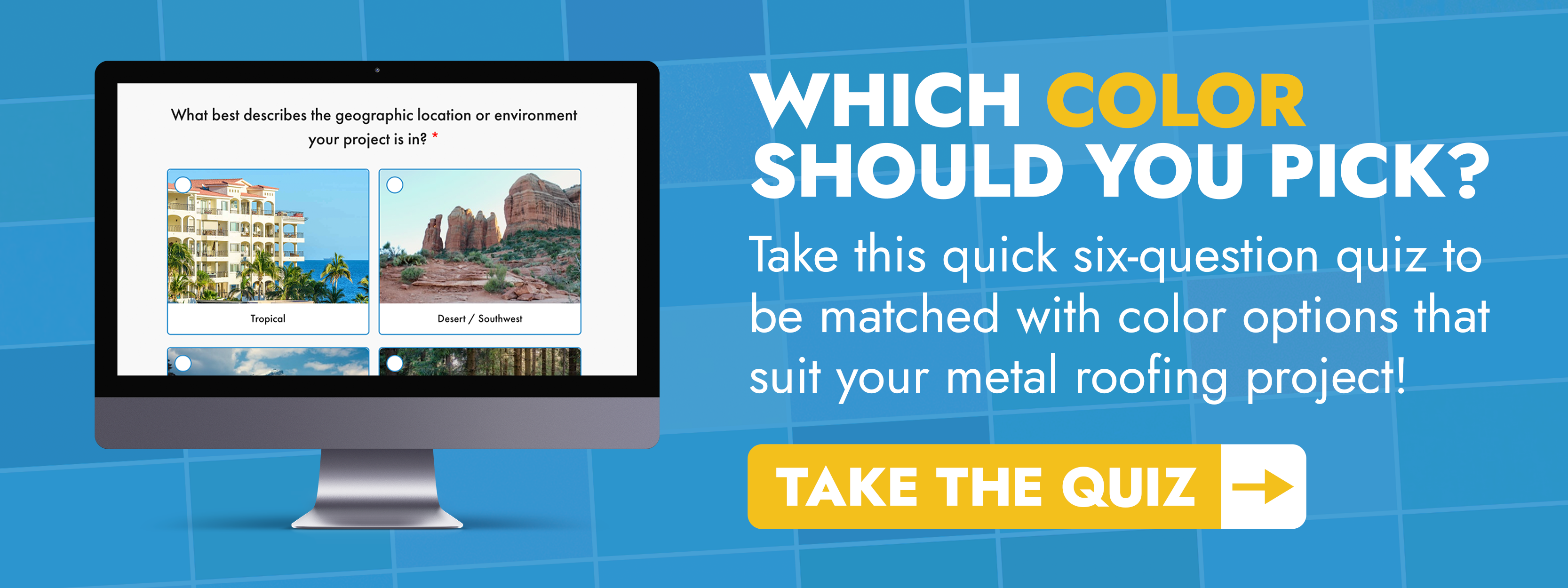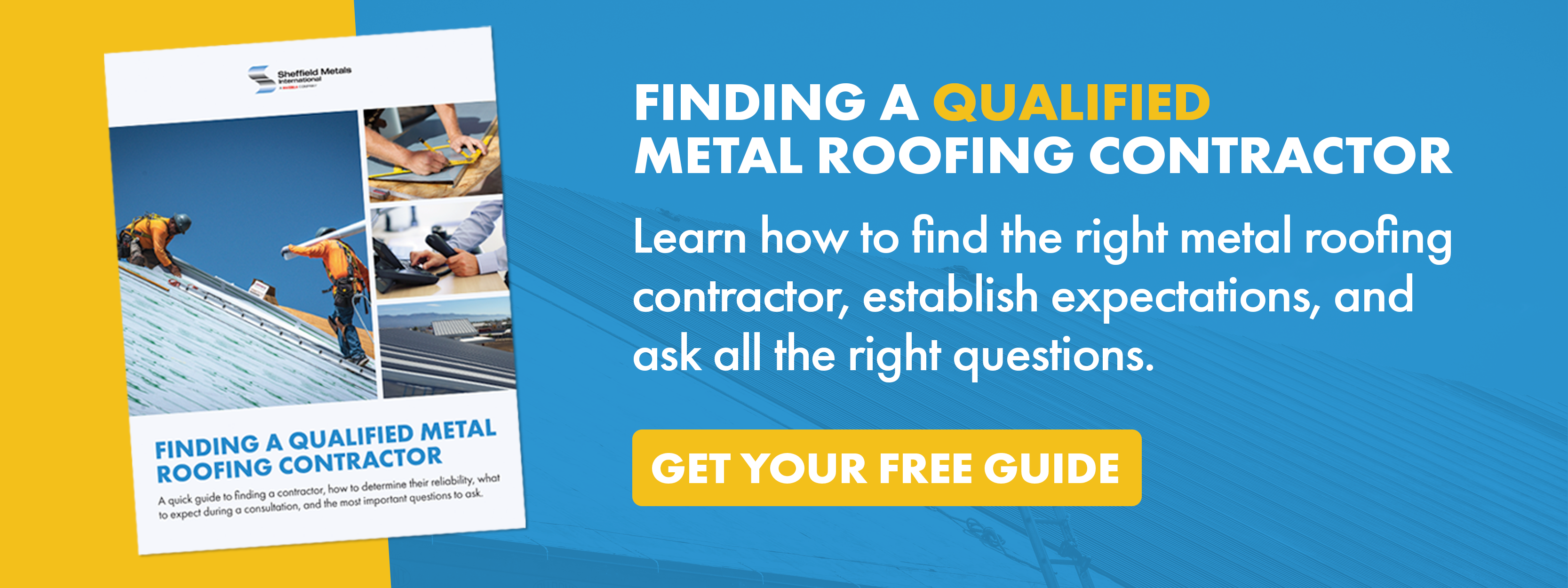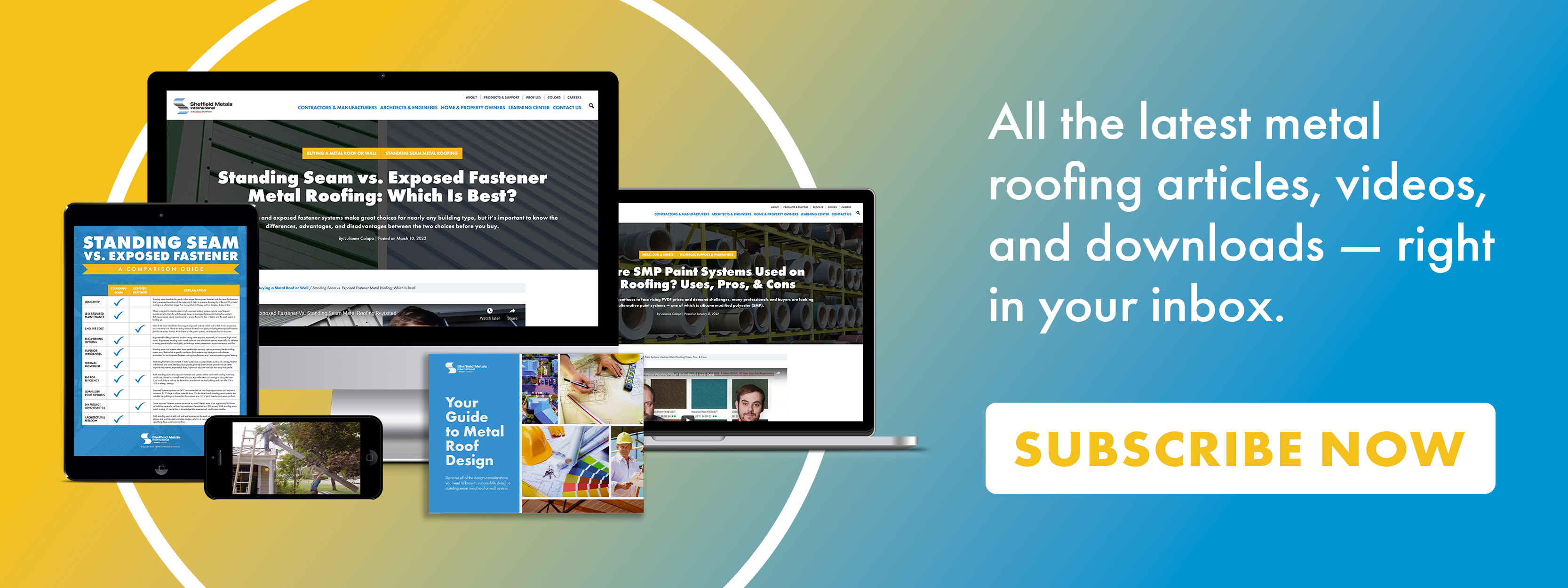Do you want to know the ins and outs of your metal roof paint warranty but are having trouble understanding the nuances?
It can be challenging to figure out what your paint warranty covers and what parts of your project might be excluded. But it’s essential to understand the terminology of a warranty so you can be confident in both the aesthetics and functionality of your metal roof.
Sheffield Metals is a leading distributor of metal roof and wall products, including painted Galvalume® and aluminum metal coils and sheets. Additionally, we back our products with paint, substrate, and weathertight warranties to ensure they’re performing the way our customers expect.
In this article, we’ll attempt to simplify a metal roof paint warranty by hitting the main points without getting lost in the weeds.

What to Know About Your Metal Roof Paint Warranty
1. A Paint Warranty Is Not a Substrate Warranty
One common misunderstanding is that a paint warranty and a substrate warranty are the same thing. However, this is not the case. The substrate warranty covers the surface on which the roofing coatings are applied — the metal itself, whether that’s galvalume, aluminum, or a similar metal material.
Therefore, the paint warranty (sometimes referred to as a finish warranty) only covers the paint that was applied over the metal substrate.
If the substrate of your roof corrodes for any reason, know that this will not be covered by your paint warranty but instead your substrate warranty.
2. SMP and PVDF Coatings Perform Differently Over Time
Note that SMP and PVDF coatings are two completely different paints systems and will carry different coverages. PVDF is the more premium and long-lasting paint system, so these tend to have better aging characteristics.
The key difference between warranties for SMP and PVDF coatings is the chalking and fading performance, measured in delta units. Fading refers to a coating’s color retention — as an example, a blue metal roof will begin to fade from its original color over time and become lighter. Chalking refers to the white residue that comes from resin degradation caused by UV light.

The chalking and fading performance of your coating will differ by paint system. PVDF coatings, the more premium option, have better chalk and fade performance when compared to SMP coatings.
The paint warranties for PVDF paint systems take this into account: While the length of warranty coverage for PVDF and SMP paint systems can be the same, the allowable amount of change is different.
For example, a 30-year warranty for SMP and PVDF coatings may have the same length of coverage, but over the course of that 30 years, the SMP paint system will likely lose its original color and chalk to a greater extent than the PVDF system, which performs better in those areas.
You can learn more about SMP and PVDF warranties and their differences in our article on the topic:
SMP vs. PVDF Paint Warranties for Metal Roofs – Sheffield Metals
3. Coverage Periods Will Differ for Chalking, Fading, and Paint Adhesion

For paint warranties, the timeline of coverage — the length of time that’s typically the headline of the warranty, such as a 40-year warranty, is typically referring to cracking, flaking, and peeling that’s visible on the roof panels. It refers to the paint adhesion to the base metal, which is the core of what a paint warranty is.
In the warranty, you’ll find coverages for other parts of your paint coating, too, such as chalking and fading. The coverage periods for paint adhesion, chalking, and fading will all differ because paint resins age uniquely and they’re measured in different ways.
For example, take Sheffield Metals’ 40-Year Limited COOLR “Paint” Warranty for AZ50 Galvalume®, G90 Galvanized, or Aluminum.
Chipping, cracking, peeling, flaking, and checking are all protected for 40 years. In that same warranty, chalking and fading is covered for 30 years. But keep in mind that chalking and fading are measured differently than cracking and flaking.
In this warranty, it explains that “Thirty (30) years from the date of installation of panels, the Coating will not chalk in excess of ASTM D-4214 method A659 number eight (8) rating when properly maintained in accordance with Sherwin Williams printed guidelines.”
And for fading: “Will not change color more than Five (5.0) Hunter ∆E units as determined by ASTM method D-2244 when properly maintained in accordance with Sherwin Williams printed guidelines.”
Those numbers and methods are dictated by industry standards that measure chalking and fading characteristics in delta units, which track the coatings’ performance over time.

Make sure you know what your main coverage period is and your coverage for chalking and fading, too.
4. Certain Environments May Require Special Warranties
If you live within a saltwater environment or certain proximity to a coastline, you will likely require a coastal warranty. Coastal warranties take into account the unique nature of coastline projects, where salt spray and wind can affect a metal roof differently than roofs in non-coastal areas.
Coastal warranties usually offer a slightly shorter warranty length than regular paint warranties. Also be aware that coastal warranties may require special considerations to ensure the paint coating remains functional throughout its coverage.
For instance, Sheffield Metals’ 35-Year Limited COOLR Coastal “Paint” Warranty for Aluminum Substrates does not cover projects extending past the water’s edge or unusual harmful fumes or foreign substances in the atmosphere that may affect the paint.
This warranty also makes clear that “the building owner shall perform a “sweet water”/ fresh tap water rinse twice a year, or more frequent, to avoid salt residue accumulation in accordance with AAMA 610.1.1979, records must be kept of the maintenance.”
This rinsing is crucial so that any damaging salt residue is regularly removed to preserve the roofing material.
5. Exclusions May Affect Your Warranty

One of the most difficult parts of understanding your warranty comes down to exclusions, because there are many and you need to be aware of them to ensure your warranty stays valid. Here are some common exclusions included in paint warranties:
- Acts of God: This includes events such as wildfires and hailstorms.
- Wind damage: Wind uplifts are a common phenomenon that can lift up on the corners of a metal roof, causing damage to the system. The right engineering and installation can help prevent damage from wind uplifts.
- Improper handling of materials during installation: It can be easy to damage metal roofing panels during installation, whether it be from scratching or denting. Qualified contractors will handle materials with care to make sure your products remain untarnished.
- Locations exposed to corrosive chemicals such as ash, fumes, and cement dust: Your unique environment is a significant aspect of what your warranty covers. For livestock facilities, water treatment buildings, or buildings with pools, chemicals that are released can affect the paint coating and cause damage, which will not be covered by a standard warranty.
- Dissimilar metal corrosion: This happens when incompatible metals come into contact with one another, such as steel and copper, and corrosion occurs as a result. Rainfall running from one incompatible metal to another can also result in corrosion.
- Adhered solar panels, snow guards or non-penetrative-accessories: In some cases, installation of solar panels or snow guards will require penetrations on the roof, which will affect your warranty. Keep in mind even areas with non-penetrative accessories, such as clamps, will not be covered by a paint warranty. Be sure you speak with your contractor and your warranty provider before these are installed.
- Using non-standard industry details: Metal roofing suppliers like Sheffield Metals provide specific, step-by-step installation details for installers to follow to ensure that the metal roofing system performs as it should. Using details that are not industry-standard could result in problems with the system and a voiding of your warranty.
Finding a good contractor that can provide you with quality products and installation is imperative so you can mitigate avoidable issues.
Additionally, finding a reliable metal roofing supplier with engineered systems that meet testing requirements can also help you avoid these issues. To get more information on exclusions and whether your project may be affected, contact your metal roofing manufacturer.

6. Claims May Be Invalid After a Certain Point
If there is a failure of your paint system and you’d like to make a claim, be sure to contact the manufacturer of your metal roofing system immediately. Claims must be presented by the customer — in writing — within 30 days of the customer becoming aware that the condition has occurred. This is outlined in Sheffield Metals’ 40-Year Limited COOLR “Paint” Warranty for AZ50 Galvalume®, G90 Galvanized, or Aluminum:
“Claims under this Warranty must be presented by the customer to Sheffield in writing during the warranty period and within thirty (30) days after Customer becomes aware that any warranted condition has occurred. Time is of the essence and failure to give notice within the specified time shall discharge Sheffield from any obligations under this Warranty. Sheffield must be given a reasonable opportunity to do an on-site inspection to determine if there is a coating failure.”
So be sure you’re submitting claims promptly — if you don’t notify the manufacturer within 30 days, the claim will not be valid.
Regular inspections of your roof can help unveil any damage to the paint system. Likewise, you may be able to spot any peeling, flaking, or cracking of the paint just by looking at it. If you can see it from the ground, that’s a good sign that there is serious damage that may be suitable for making a claim.
Once the claim is received, the manufacturer will usually schedule a site inspection to determine the extent of the damage and the validity of the claim. If it is valid, the manufacturer will work to coordinate all necessary parties to resolve the issue and fix your roof. See a full outline of the paint warranty claims process here:
Paint & Substrate Warranty Claims Process: How to Submit a Claim
7. Signed Warranties Need to be in the Hands of Your Manufacturer

Make sure your signed warranty gets back to the issuer of the warranty. With roofing projects, there can be many different parties and documents involved. After signing, be sure to get it in the right hands.
Looking for a Reliable Metal Roof Paint Warranty?
Finding a reliable metal roof paint warranty starts with finding a reliable metal roof supplier. A trusted supplier will be confident in the functionality of their products and stand by them with warranties that make sense.
At Sheffield Metals International, we understand how important it is to provide products that last. Our products are coated with high-quality coatings from Sherwin-Williams and are backed by warranties.
We’re happy to provide articles, videos, and downloads to help those in the metal roofing industry on a variety of topics. You can find more information on metal roof paint warranties via the resources below:
And check out our full list of paint warranties here:
Paint & Substrate Warranties – Sheffield Metals
